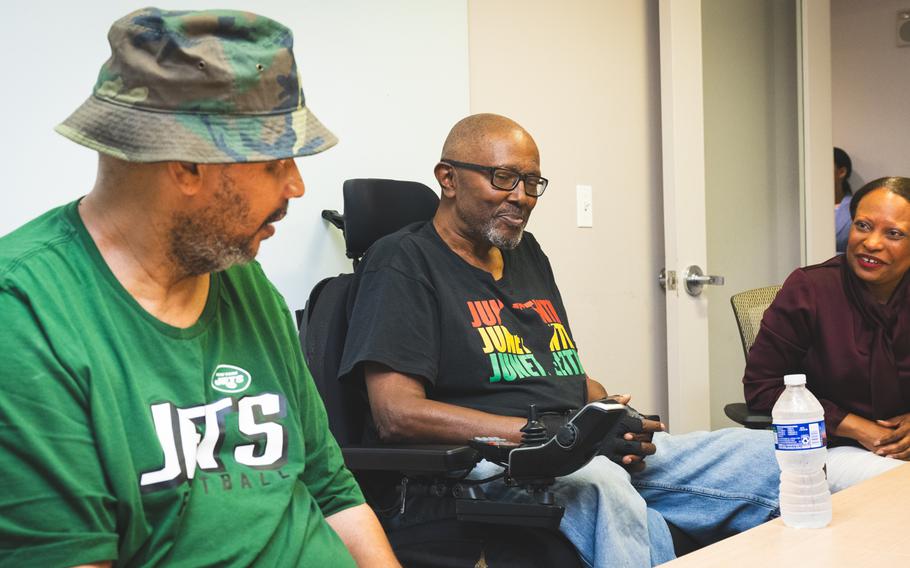
Veterans Richard White, far left, and Michael Chinn speak with HUD Acting Secretary Adrianne Todman about their experiences using a rental assistance voucher program through the Departments of Housing and Urban Development and Veterans Affairs. (Department of Housing and Urban Development)
WASHINGTON — A voucher program exclusively for veterans who are homeless or at risk of homelessness will receive $78 million to fund rental assistance for thousands of veterans under a partnership between the departments of Housing and Urban Development and Veterans Affairs.
HUD and the VA announced the funds last week for additional vouchers through the HUD-Veterans Affairs Supportive Housing program, which combines rental assistance and health services for income-eligible veterans.
More than 83,000 veterans and their families now participate in the program. Vouchers are renewed yearly for qualifying beneficiaries.
An additional 7,000 veterans who are aging, disabled and on low or fixed incomes are expected to benefit from the new funding, according to HUD.
Johnny Graves of Washington, D.C., qualified for a rent subsidy through the HUD-VASH program.
Graves, a 70-year-old Marine Corps veteran, said he relies on monthly Social Security checks and VA disability compensation for income.
“My social worker at the VA gave me a list of apartments, and I’ve been calling around. Some have a waiting list,” said Graves, who served in the military from 1974-1980 with deployments to France, Denmark and Cuba. “The place I’m in now is noisy and run down. I’m no better than anyone else. But at my age, I think it’s time to find something more suitable.”
Under the terms of the program, Graves and other veterans have 120 days to find a place from a list of participating landlords.
The HUD-VASH program is one of the few federal programs for which Congress coordinates appropriations across two different subcommittees to fund housing assistance and supportive services, according to HUD. It also is the only rental assistance program in which eligibility is limited to veterans.
The program is available in all 50 states, as well as the District of Columbia, Puerto Rico and Guam, according to HUD.
Under the VA-HUD partnership, participants are assigned a case manager who helps them find an apartment and connects them with VA health services.
Appropriations are provided to HUD for vouchers and to the VA for case coordinators and other services to support veterans in their homes.
Qualifying veterans pay about 30% of their income each month to rent an apartment subsidized through a HUD-VASH voucher, according to HUD.
A change in income can affect the percentage that they are expected to pay.
Residents who do not pay their portion of the rent will not be able to keep the apartment. The turnover rate is about 15% yearly, HUD said.
“HUD-VASH vouchers may be leased in a variety of housing types to ensure veterans are able to access housing that meets their specific needs. Veterans can access certain special housing types, such as congregate housing, that can be particularly beneficial for veterans as they age,” said Zachary Nosanchuk, deputy press secretary at HUD.
Since the HUD-VASH program started in 2008, it has helped more than 200,000 veterans who are homeless or at risk of being homeless find affordable housing, HUD said. The vouchers are administered by public housing authorities.
Michael Chinn, 73, is a disabled veteran in Washington, D.C., who qualified for a HUD-VASH voucher. Chinn said he receives monthly Social Security income.
Chinn, who is retired and uses a motorized wheelchair, lives in an apartment building that needs major repairs. His right leg was partially amputated due to disease after leaving the military.
Chinn, who served as an Air Force staff sergeant, said he experienced depression and post-traumatic stress disorder in the decades following military service in the Vietnam War.
Among his duties was loading the caskets of deceased American soldiers onto planes headed to the U.S., said Chinn, who was deployed to Thailand and Cambodia from 1971-1977.
He recently found alternative housing in his neighborhood that accepts rental vouchers through the HUD-VASH program. He said it will be much easier for him to maneuver his wheelchair in the new building.
“I try to be as independent as I can,” said Chinn, who is waiting for a final decision on the apartment.